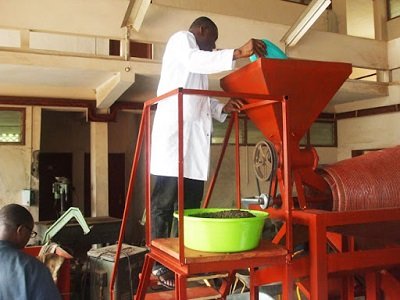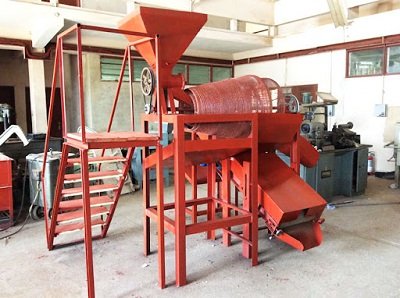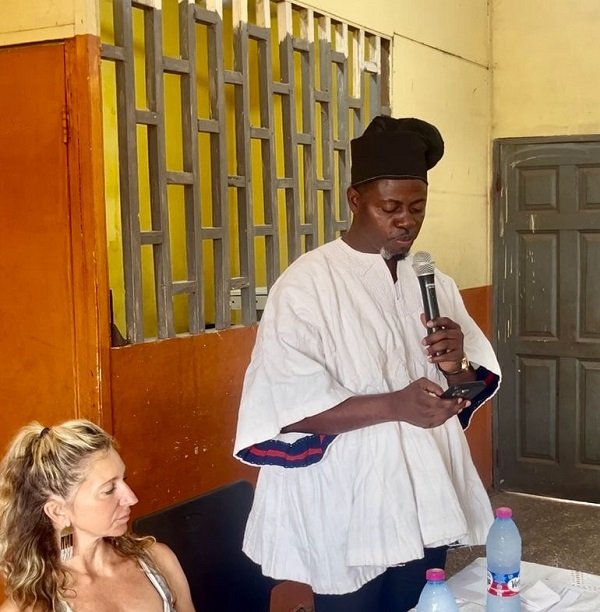News
Fact sheet about agric machines in Ghana

It is interesting to note that:
- Diesel/kerosene fired dryer was released in 2014. This is a dryer that employs indirect heating for drying grains and for processing food. It is applicable in all maize growing areas in Ghana.
The dryer is suitable for crop grain drying and for food processing; atomiser is locally manufactured; does not use exhaust fumes for drying. The technology reduces postharvest losses.
- Walk-in hot air cabinet dryer was released in 1993. The walk-in hot air cabinet dryer is available in four sizes 56 trays, 84 trays, 100 trays and 140 trays.
The dryer uses electrical energy as its source of fuel and has automatic temperature control system and a 24-hour timer to predetermine period of operation.
It is applicable in all cereals, root and tubers, and fruits growing areas in Ghana. It is used for drying of food commodities such as roots and tubers, vegetables, fruits, cereals, etc.
- Micro-nutrients fortification mixer for dietary supplementation for malnourished community was released in 2007.
The technology is for fortification of food with vitamin premix for malnourished children and women in Northern Ghana.
It is applicable in Northern Ghana. It is used for improvement of nutritional status of rural communities of northern Ghana.

- Snail meat preservation was released in 1995. The technology describes a more hygienic, appropriate and low-cost method for the preparation, spicing and solar dehydration of snail meat.
A second technology developed involved spice extraction and snail meat preparation for the corning of snail meat in brine. It is applicable in snail rearing communities.
It is used for snail meat preservation (solar dehydrated and canned) to offset scarcity of the product during the dry season when snails are scarce.
- Palm kernel shell separator was released in 2012. The technology reduces time for kernel shell separation from 24 hours per 60 kilogramme material to seven minutes per 60 kilogramme material.
It eliminates the use of water in the kernel separation process. Additionally, it eliminates the use of clay in the kernel shell separation process. The efficiency of separation ranges between 90 per cent and 95 per cent, depending on the cracking efficiency. It is suitable for separating palm kernel shells.
Two levels of beneficiaries are targeted. The first would be agro-industrial machinery fabricators who can be trained to fabricate the equipment for sale to palm kernel oil producers. Second, the numerous women and women’s groups scattered all over the country and nearby countries who are involved in palm kernel oil production.
- Best processing practices indicators for artisanal mills to produce high quality crude palm oil was released in 2012.
Attributes: Minimum boiling/sterilisation time of two hours 30 minutes. Keep fruits and ‘digested fruit matrix’ hot throughout digestion and pressing process. Ensure adequate clarification. Ensure adequate sieving to reduce dirt or insoluble content.
The technology is suitable for grain drying and food processing. It is used for production of crude palm oil that meets standards. It minimises postharvest storage of fruits prior to digestion to three to five days.
Source: Manual of Agricultural Technologies developed by
CSIR, MAG and MoFA
Page: 137-140
News
Support Street Academy to Break Cycle of Poverty in Society — Odododiodioo MP

Mr. Alfred Nii Kotey Ashie, the Member of Parliament for the Odododiodioo Constituency in the Greater Accra Region, has assured the Accra Street Academy of his support in achieving its mission of uplifting vulnerable children within the community to break the cycle of poverty. “Without the needed support, your efforts may go round in circles due to the enormity of the task. This should not be left on the shoulders of the Academy alone. You need support from both government and the private sector. With that, the Academy would be in a good position to shape the future of these children on the streets,” he said.
The Accra Street Academy, originally formed in 1985 as a boxing arena, now serves as a school for deprived children, with most of its population numbering hundreds of pupils being neglected children from the streets of Jamestown and its environs. Mr. Alfred Nii Kotey Ashie made these remarks at the annual stakeholders’ meeting and fundraising event held over the weekend under the theme “Empowering Street Children: Health and Wellness.” The event is one of the Academy’s annual programmes, organized to raise funds and other forms of support to aid the school in catering to the needs of the children and holding its Christmas get-together.
According to the MP, it is worth noting that these children are taught and provided with two meals and a snack daily through the support of benevolent members of society. In view of this, he promised to facilitate the acquisition of documents needed for the construction of an Astroturf within the school’s premises. He noted that “every child has the right to play, and therefore I pledged to do my best to secure the needed documents” for the project to commence.
The legislator disclosed that over the years, the academic programmes of the Accra Street Academy have transformed children surviving on the streets into successful adults. He therefore urged other members of society to partner with the school to “help pupils rise higher for a better Ghana.” In the 2025/26 academic year, 22 pupils were absorbed by the Accra Metro Education Directorate as they transitioned into various Junior High Schools, while still returning to the Accra Street Academy for academic support.
Ms. Yvonne Abba-Opoku, a chartered governance advisor and senior executive in the nonprofit and charity sector, stated that the best gift to give a child was education.
By Spectator Reporter
Join our WhatsApp Channel now!
https://whatsapp.com/channel/0029VbBElzjInlqHhl1aTU27
News
Attend antenatal clinics for safe delivery … expectant mothers urged

Mrs Regina Kudom, Senior Midwifery Officer at the New Atuabo Health Centre in the Tarkwa Nsuaem Municipality, has urged expectant mothers to attend antenatal clinic regularly for safe delivery.
She revealed that “in Tarkwa and its environs many pregnant women prefer staying at prayer camps, we are not against that, you can be there, but when your time is up for your antenatal session make sure you attend.”
Mrs Kudom gave the advice when the Gold Fields Ghana Foundation (GFGF) observed the World Prematurity Day with pregnant women at New Atuabo, Huniso and Awudua health centres.
World Prematurity Day falls on November 17, every year, and it is celebrated to raise awareness about the challenges faced by pre-term babies and their families.
She said research suggested that sex during pregnancy could soften the cervix and potentially aid in labour preparation.
“That is the reason why we encourage pregnant women to have sex with their partners, if they do not have any health implications,” she added.
Mrs Kudom appealed to the GFGF to upgrade the New Atuabo health centre as the current structure was too small because they received many patients daily.
Madam Ayishetu Mohammed, Project Coordinator for GFGF, explained that they received donations from Project C. U. R. E and the items were given to health facilities in their operational area.
She stated that they noticed there were baby dresses, sanitary pads, and baby apparel, so they decided to distribute them among expectant mothers in three of their host communities.
Madam Mohammed said because the foundation was interested in preventive care, they brought a midwife from the Tarkwa Mine hospital to educate the pregnant women.
She extolled the midwives in New Atuabo health centre for the education they gave to the pregnant women and implored them to heed to the advice given during antenatal visits to reduce maternal deaths in the Tarkwa Nsuaem and Prestea Huni-Valley Municipalities.
Mr Paa Kwasi Egan, Deputy Chief Physician Assistance, emphasised that a pregnant woman being anemic meant she was not eating a balance diet, and added that, “Some of these women do not have money to buy food or visit antenatal clinics.”
He said when men follow their wives for antenatal visits, they would be educated extensively on why they should provide funds for their pregnant wives.
Mr Egan, therefore, encouraged all men to be involved in their pregnant wives’ antenatal care appointments so they could learn more about pregnancy, childbirth, and parenting. – GNA







